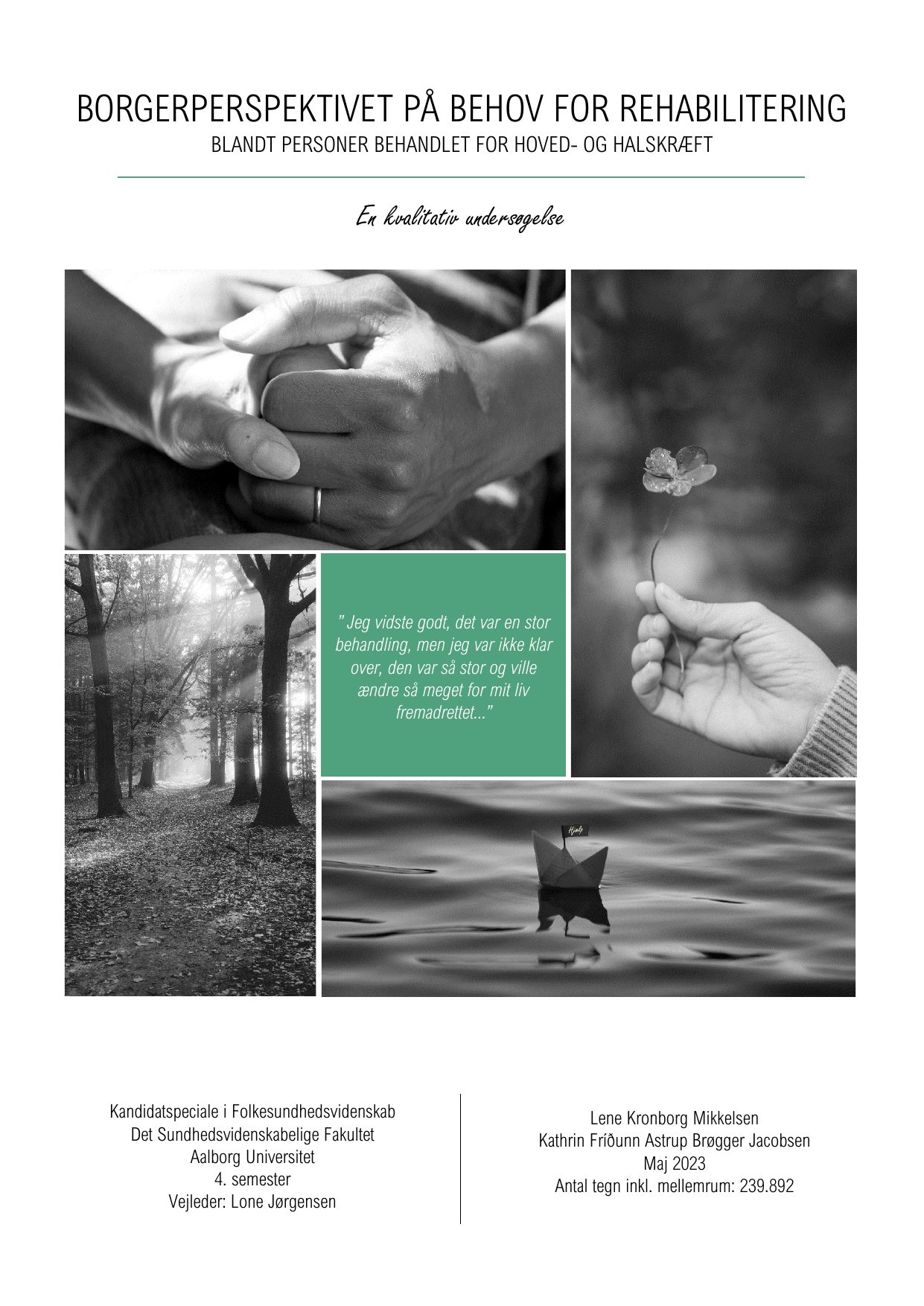
Borgerperspektivet på behov for rehabilitering blandt personer behandlet for hoved- og halskræft
Oversat titel
The citizen perspective on the need for rehabilitation among people treated for head and neck cancer
Semester
4. semester
Uddannelse
Udgivelsesår
2023
Afleveret
2023-05-30
Antal sider
121
Abstract
Resumé Introduktion: I Danmark er prævalensen af hoved- og halskræft cirka 17.000, og incidensen er stigende. Behandling heraf medfører alvorlige følgevirkninger med store fysiske, psykiske og sociale konsekvenser og massive forandringer i hverdagslivet for den enkelte person. Hertil viser litteraturen mangel på kommunale rehabiliteringstilbud og tilstrækkelige faglige ressourcer. Ydermere viser forskning udækkede rehabiliteringsbehov blandt personer behandlet for hoved- og halskræft, hvorfor der nationalt ses fokus på kvalitetsudvikling af rehabiliteringsindsatsen med udgangspunkt i borgerperspektivet. Formål: Formålet med specialet er at opnå en forståelse af, hvilke behov for rehabilitering personer behandlet for hoved- og halskræft oplever, for at udforske forandringsperspektiver i rehabiliteringsindsatsen i kommunalt regi. Hensigten er at styrke rehabiliteringsindsatsen for personer behandlet for hoved- og halskræft i Danmark. Metode: I specialet anvendes systematisk litteratursøgning samt semistrukturerede kvalitative interviews. I alt interviewes ti borgere behandlet for hoved-halskræft, hvoraf seks er rekrutteret i kommunalt regi og fire er rekrutteret i regionalt regi. I litteraturstudiet anvendes Braun & Clarkes (2006) tematiske analyse, og Ricoeurs fortolkningsteori inspireret af Pedersen & Dreyer (2018) anvendes til fortolkning af interviewdata. Resultater: Borgere behandlet for hoved- og halskræft oplever varierende behov for rehabilitering i form af udfordringer med ernæring og oral sundhed, udpræget træthed og søvnbesvær, varierende informationsbehov, psykiske konsekvenser, kontakt med andre behandlet for hoved- og halskræft samt henvisning til kommunal rehabilitering ved behov. Resultaterne indikerer forandring i form af øget fokus på forståelse af forholdet mellem mennesket og maden, målrettet information om følgevirkninger og håndtering heraf med fokus på sundhedskompetence, tilbud om fysisk træning målrettet smerter og træthed, tilbud om psykisk rehabilitering samt tydelige rammer for henvisning til kommunal rehabilitering. Konklusion: Resultaterne i undersøgelsen bidrager til forståelsen af borgerperspektivet på rehabiliteringsbehov og kan informere og styrke viden i den kommunale rehabiliteringsindsats for personer behandlet for hoved- og halskræft i Danmark. Dog indikerer resultaterne også kompleksiteten i henvisningsprocessen, hvilket fremhæver behovet for yderligere undersøgelser af barrierer og facilitatorer for henvisning og adgang til kommunal rehabilitering.
Introduction: In Denmark, the prevalence of head and neck cancer is approximately 17.000, and the incidence is increasing. The treatment of this condition leads to serious side effects with significant physical, psychological, and social consequences, resulting in substantial changes in the everyday life of individuals. Moreover, the literature indicates a lack of municipal rehabilitation services and sufficient professional resources. Additionally, research shows unmet rehabilitation needs among individuals treated for head and neck cancer, leading to a national focus on quality improvement of rehabilitation efforts based on the citizen's perspective. Aim: The aim of this study is to gain an understanding of the rehabilitation needs experienced by individuals treated for head and neck cancer in order to explore perspectives on change in rehabilitation intervention within a municipal setting. The intention is to strengthen the rehabilitation intervention for individuals treated for head and neck cancer in Denmark. Method: The study utilizes systematic literature search and semi-structured qualitative interviews. A total of ten citizens treated for head and neck cancer are interviewed, with six recruited from municipal settings and four from regional settings. Braun and Clarke's (2006) thematic analysis is employed in the literature study, and Ricoeur's interpretation theory inspired by Pedersen and Dreyer (2018) is employed for interpreting the interview data. Results: Individuals treated for head and neck cancer experience varying rehabilitation needs, including challenges with nutrition and oral health, pronounced fatigue and sleep disturbances, diverse information needs, psychological consequences, interaction with others treated for head and neck cancer, and referral to municipal rehabilitation when needed. The results indicate changes in the form of increased focus on understanding the relationship between the individual and food, targeted information on consequences and coping mechanisms with an emphasis on health literacy, provision of physical exercise targeted at pain and fatigue, availability of psychological rehabilitation, and clear guidelines for referral to municipal rehabilitation. Conclusion: The study's results contribute to the understanding of the citizen's perspective on rehabilitation needs and can inform and enhance knowledge in the municipal rehabilitation interventions for individuals treated for head and neck cancer in Denmark. However, the results also indicate the complexity of the referral process, highlighting the need for further research on barriers and facilitators to referral and access to municipal rehabilitation.
Emneord
